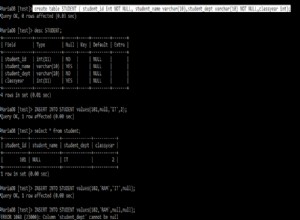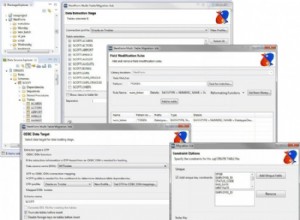Alternativ zu rekursivem SQL können Sie auch das SQL MODEL verwenden Klausel. Ich persönlich finde das etwas einfacher zu lesen als rekursives SQL, obwohl es schwieriger zu schreiben ist (weil die meisten Leute, wie ich, die Syntax nachschlagen müssen).
-- "test_data" is just a substitute for your real table, which I don't have
-- it is just so people without your table can run this example and would
-- not be part of your real solution.
with test_data ( sort_col, addend ) as
( SELECT 'A', 3 FROM DUAL UNION ALL
SELECT 'B', 7 FROM DUAL UNION ALL
SELECT 'C', 6 FROM DUAL UNION ALL
SELECT 'D', 5 FROM DUAL UNION ALL
SELECT 'E', 9 FROM DUAL UNION ALL
SELECT 'F', 3 FROM DUAL UNION ALL
SELECT 'G', 8 FROM DUAL ),
-- Solution begins here
sorted_inputs ( sort_col, sort_order, addend, running_sum_max_15) as
( SELECT sort_col, row_number() over ( order by sort_col ) sort_order, addend, 0 from test_data )
SELECT sort_col, addend, running_sum_max_15
from sorted_inputs
model
dimension by (sort_order)
measures ( sort_col, addend, running_sum_max_15 )
rules update
( running_sum_max_15[1] = addend[1],
running_sum_max_15[sort_order>1] =
case when running_sum_max_15[CV(sort_order)-1] < 15 THEN
running_sum_max_15[CV(sort_order)-1] ELSE 0 END+addend[CV(sort_order)]
)
ERGEBNISSE
+----------+--------+--------------------+
| SORT_COL | ADDEND | RUNNING_SUM_MAX_15 |
+----------+--------+--------------------+
| A | 3 | 3 |
| B | 7 | 10 |
| C | 6 | 16 |
| D | 5 | 5 |
| E | 9 | 14 |
| F | 3 | 17 |
| G | 8 | 8 |
+----------+--------+--------------------+




